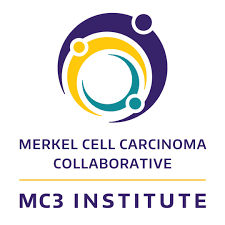Merkel Cell Carcinoma Collaborative Institute (MC3)
Mission
We collaborate to cure Merkel cell carcinoma.
Values & Behaviors:
- Integrity – We are deliberate, accurate, and transparent. We do our homework and choose our problems carefully. We balance evidence-driven research with compassion. We never take for granted the precious gifts from patients (data, specimens, and funds) that make our progress possible.
- Education – We use the appropriate language for each audience to ensure understanding for everyone. We empower the world with information, so MCC patients have the best care options and live longer. We break down barriers (cost, lack of information, location) so patients have access to the best MCC resources. We train healthcare providers and scientists to be compassionate, ethical, and knowledgeable.
- Collaboration – We collaborate because it is the most effective way to help our patients and advance the field. We believe team-based patient care is essential. We are approachable, curious, and available. We eagerly assist teams around the world and share data to accelerate progress.
- Transformative – We believe in thinking outside the box and challenging the status quo. We are tenacious and driven to push the field forward. We believe that what we do will make a difference for patients.
- Patient focused – We make decisions based on what is right for the patient. An MCC patient represents a community of people–we care for all of them. We treat patients like they are members of our own family. The challenges that patients experience guide our priorities.
Research Agenda
The Merkel Cell Carcinoma Collaborative (MC3) Institute was established to improve the lives of patients with Merkel cell carcinoma (MCC) through translational research. Based at the University of Washington and Fred Hutchinson Cancer Center, our mission is to advance patient outcomes by focusing on translational immunobiology—harnessing anti-cancer immune responses and applying them to treatment.
We provide structure for more than 100 MCC collaborators in Seattle and worldwide. MC3 supports and manages scientific research projects, trains junior scientists and clinicians, advocates for patient needs, and works to deliver the best MCC clinical care in the world.
We aim to expand research, clinical and educational activities in the following realms:
- Resources for research: Expand the specimen repository and clinically annotated patient database; share immunoassay reagents and provide biostatistics/bioinformatics support to collaborators.
- Patient Support: Employ two full-time clinical research fellows, coordinate weekly patient tumor boards, and oversee clinical blood testing.
- Research: Analyze patient outcomes to identify optimal treatments and surveillance strategies that inform national cancer guidelines (NCCN). Lead and support collaborative research across multiple institutions.
- Education & Community Outreach: Host annual events such as the Merkel Dinner and MC3 retreat; operate an Undergraduate Research Training Program; circulate an annual State of the Institute report (covering projects, donations, and people); update and maintain the merkelcell.org website; and support the MCC Interest Group meeting and biennial International MCC Symposium.
Principal Faculty
- Paul Nghiem, Director and Faculty Lead
- Candice Church, Director of Scientific Research
- Rima Kulikauskas, Director of Specimen Repository
- Krista Lachance, Director of People and Programs
Home College or School
School of Medicine and Fred Hutchinson Cancer Center
External Partners
A.C. Camargo Cancer Center, Albert Einstein College of Medicine, Assistance Publique – Hôpitaux de Paris, Brown University, Cleveland Clinic Foundation, Dana-Farber Cancer Institute, Johns Hopkins University, Karolinska Institutet, Mayo Clinic, Melanoma Orlando, MD Anderson Cancer Center, Newcastle University, New York University Grossman School of Medicine, University of Pennsylvania, Providence Health, Princess Hospital, Health and Social Care Northern Ireland, Stanford University, University of Arizona, University of Kentucky, University of Michigan, University of Tours University of Wisconsin–Madison, University of Virginia, Washington University in St. Louis, and Yale University.
